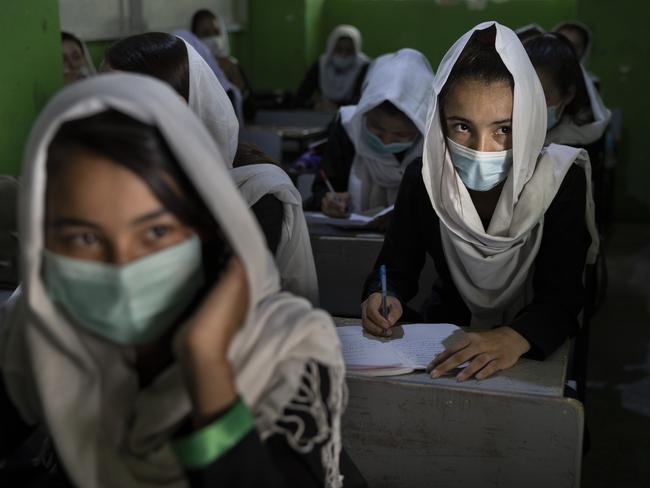
Return for a moment to 1999. Hollywood was awash with celebrities crying for the plight of women in Afghanistan. A star-studded Feminist Majority campaign was in full flight as first lady Hillary Clinton mounted the podium on Capitol Hill to denounce the Taliban. Fast-forward to September 2001, less than a year after president George W. Bush had taken the oath of office and was faced with the deadliest terrorist act in history when Islamists hijacked passenger planes and flew them into the Twin Towers and the Pentagon. The 9/11 terrorist attack left more than 6000 injured and 2977 dead. The Taliban was driven from power after refusing to extradite al-Qa’ida leader Osama bin Laden, whose group had financed the atrocity.

Operation Enduring Freedom was an example of a just war against a criminal regime. The eventual triumph of the Taliban is portrayed as a failure of the West. But the reality is not so simple. Afghanistan has long been a country characterised by tribalism and the problems common to tribal societies such as political instability, tribal warfare, low education levels, insularity, corruption and lack of economic and social progress. It has endured three decades of sustained conflict. Understandably, the overwhelming desire among Afghan people is for peace, stability and a sovereign state that represents their values. It is on the last point the Western front failed.
A survey by The Asia Foundation in Kabul revealed 64 per cent of Afghans believed in reconciliation with the Taliban. Men were more supportive of the idea (70 per cent) than women (59 per cent). However, 80 per cent also thought women’s rights, including the right to vote, must be protected in any reconciliation arrangement. If the Taliban refused to uphold women’s basic rights such as the rights to education and employment, 65 per cent of respondents indicated they would not support the group.
The Taliban’s recently professed commitment to women’s rights was welcomed by those hopeful that the soldiers of jihad had become overnight moderates. In his first news conference, Taliban spokesman Zabihullah Mujahid played into liberal optimism, saying the group would let women work and study. Cue the applause. He stressed the Taliban was committed to the rights of women “under the laws of sharia”.
By commonly used measures of political and social progress, sharia law is an impediment to the pursuit of women’s equality. Yet in a comprehensive global survey on Islam worldwide, Pew researchers found support for sharia was highest in Afghanistan, where 99 per cent favoured making it the official law of their country.
To believe in democracy means supporting the self-determination of citizens. In Afghanistan, the overwhelming majority want to live under sharia law. However, interpretations vary widely and the Taliban has a history of exacting horrific revenge on anyone who dissents from its strict version of Islamic law.
According to the media, coalition forces achieved nothing for their 20-year investment in liberating Afghanistan from the Taliban. But gains were made on the ground. The Brookings Institution drew on global research to detail some of the progress. Between 2003 and 2017, enrolment of Afghan girls in primary school increased from fewer than 10 per cent to 33 per cent. Women’s life expectancy grew from 56 years in 2001 to 66 in 2017. In 2020, a fifth of civil servants were women and 27 per cent of Afghan members of parliament were women. Yet statistics also showed that violence against Afghan girls and women is extreme and widespread.
A joint UN-Promundo study found pervasive domestic violence in Afghanistan with 80 per cent of women having endured physical assault. A fifth of women reported suffering sexual violence from an intimate partner. Add to this disturbing profile harmful cultural practices such as so-called honour killings where men murder female relatives using religious morality as a justification. And then there is child marriage. In 2018, UNICEF reported nearly one in five (17 per cent) Afghan girls will be married by their 15th birthday. It is a clear breach of the UN Convention on the Rights of the Child to which Afghanistan is a signatory, and reveals the impotence of international human rights activism.
The Wall Street Journal reported last week that in the Northern Province of Takhar, a senior Taliban figure told men at a mosque all girls over 15 should be handed over to the Taliban for marriage to jihadis. If true, it indicates the new “moderate” Taliban is following a decidedly radical Islamist path.
The future of women in Afghanistan is bleak. The worst kind of punishment will be reserved for those who have walked in freedom and cannot live in chains. The West has exhausted the doctrine of humanitarian intervention, but we can provide shelter for our sisters and brothers in the fight to liberate humanity from tyranny. For the world to be free, we must protect them as our own.




The story of Afghanistan is written on women. They were the symbol of national liberation from the despots of the Taliban jihad. Their freedom was a promise made by foreigners determined to raise democracy from the ruins of a failed Islamic state. But as days turned into months and months into years, the revolutionary feminists of Afghanistan came to see their liberators as colonisers while their pious compatriots prayed for the infidels to leave. The Taliban might have destroyed the dream of enlightenment when it took Kabul, but the spirit of sharia had never left.